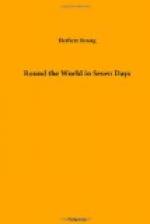“Pull yourself together, Kate. I am sure he is all right. He probably started later than he intended. You may be sure he wouldn’t start unless the engine was in thorough good order. Let us go in and play patience.”
“No, no; I must move. Let us walk down the road.”
Barracombe was more perturbed than he would admit. It was unlike Smith to miscalculate. His telegram was probably sent off at the moment of starting, or even after he had started, from Toronto. If the engine had worked at all, it would work at full speed, so that the loss of time on the journey implied either contrary winds, a mistaken course, or a serious mishap. Kate was so little in the mood for talking that Barracombe in responsive silence could toss the various probabilities about in his mind until he felt a nervous excitability that annoyed him.
They walked up and down the silent road. The church clock struck a quarter to twelve. The minutes dragged until it was again heard. A little after twelve they stopped short at the same moment; Kate grasped Barracombe’s arm.
“Listen!” she said.
A faint sound, like the murmur of the wind, but becoming louder with extraordinary rapidity.
“Oh, Billy!” cried the girl. “Run; he’ll be at the sheds first.”
She caught his hand and tugged him towards the park gate, a hundred yards distant.
“My dear Kate!” he protested; “I’m not so young as I was. Let him be there first, confound him!”
But he ran all the same. The engine was roaring overhead, fortissimo; looking up, the two panting runners saw the flashlight. A sudden silence, as when the word tacet in an orchestral score hushes to silence bassoons and horns, drums and cymbals, all the instruments that but a moment before were convulsing the air with myriad waves of sound.
“He’s gliding!” cried Kate, standing breathless at the door of the shed. The machine descended silently and rested on the smooth level sward. Kate darted forward.
“Oh, Charley!” she cried; “you’ve come!”
CHAPTER XVIII
THE LAST LAP
“Rather late, ain’t you!” said Barracombe, as Smith jumped from the aeroplane.
“Hallo, Sis. Hallo, old man!” cried Smith. “We’ve done it; seven days, to the minute!”
Kate flew into his arms: only next day did she discover the ruin of her dress.
“I’ve a voice like a corncake,” said Smith, disengaging himself. “Glad to see you, Billy.”
“You’re a wonder! But, God bless me! you look awfully done up. You look positively ill. Come up to the house at once; we don’t want you crocked.”
“Come on, Roddy,” said Smith hoarsely. “You’ll stay with us to-night. Leave the machine for once. You see, Billy, I have to rejoin at nine to-morrow—to-morrow, I say; I mean this morning. That gives me nine hours, and as I haven’t been to bed for a week I want seven good solid hours sleep.”




